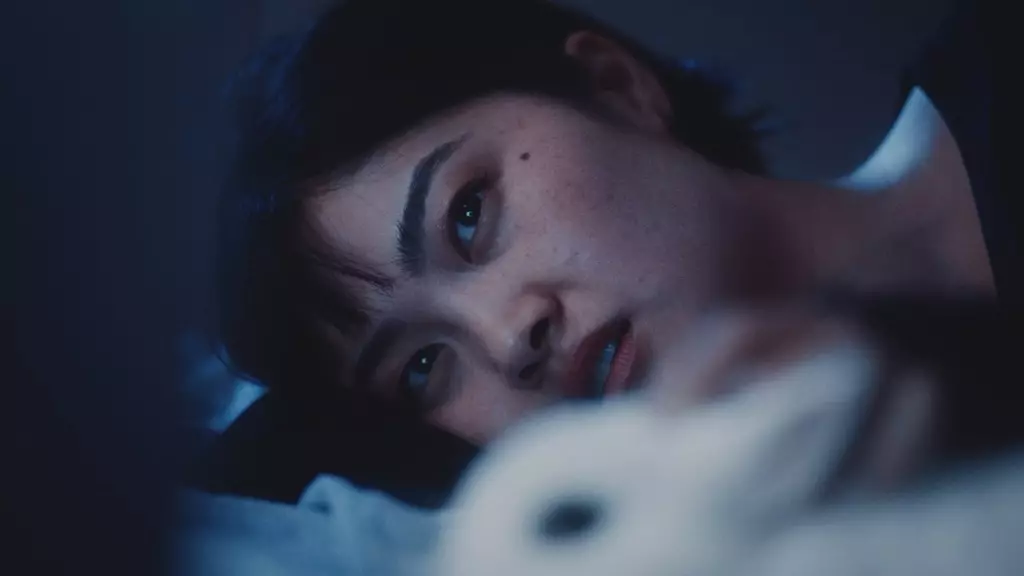In her feature debut, writer, director, and star Katarina Zhu presents “Bunnylovr,” a poignant exploration of complicated family dynamics, the intricacies of privilege, and the quest for self-love. The film centers around Becca, portrayed by Zhu herself, a Chinese American woman navigating the trials of life in New York City while engaging in the often-misunderstood world of sex work as a cam girl. Zhu’s portrayal of Becca encapsulates the multifaceted struggle for personal agency amid a backdrop of societal expectations and personal disappointments.
The plot catalyzes when Becca receives a surprising gift—a live bunny named Milk—from a persistent and obsessive client. This innocent creature becomes a symbol of transformation for Becca, serving as a counterpoint to the highly transactional and often exploitative relationships she maintains with the people around her. The film cleverly dissects the ways in which Becca’s identity is shaped by her interactions with her estranged father, her manipulative friend, and an emotionally unavailable ex-boyfriend, each pushing her further into patterns of self-objectification.
Becca’s experiences reflect many young women’s encounters with external pressures and societal standards regarding femininity and desirability. Her father, William, played by Perry Yung, embodies unresolved familial tension as Becca is thrust into the role of his “lucky charm,” assisting him in card games while grappling with their strained relationship. This dynamic reveals deeper layers of psychological complexity, exposing how parental figures can shape one’s self-worth through emotional neglect.
Conversely, Becca’s best friend, Bella (Rachel Sennott), is portrayed as an artist who draws inspiration from Becca’s life yet ultimately objectifies her through a misguided perception of feminist empowerment. This relationship articulates the blurred lines that often exist between friendship and exploitation, illustrating how well-meaning interactions can still perpetuate feelings of violation and discomfort in vulnerable individuals.
Zhu’s film does not shy away from addressing the often precarious nature of digital relationships. Becca’s interactions with John, her regular cam client (played by Austin Amelio), illustrate a paradox central to many online encounters—while they can offer a semblance of intimacy and financial stability, they are underpinned by an uneven power dynamic. This relationship is essential for Becca’s personal evolution; through her online persona, she grapples with her self-worth while simultaneously confronting the implications of commodifying companionship. It signals a growing comfort in her virtual encounters, ultimately amplifying her internal struggles and affecting her ability to form authentic, healthy connections.
The arrival of Milk is significant in this context. Initially resistant to the presence of the rabbit, Becca eventually grows attached to it, finding solace and comfort in caring for a creature that demands nothing but her love. Milk serves as a catalyst for Becca’s emotional awakening, encouraging her to reclaim her agency and assert herself against the often draining emotional demands her relationships impose.
As the narrative unfolds, Becca embarks on a personal journey that leads her to a place of mindfulness and awakening. The film eloquently articulates the struggle of a people-pleaser in a society that often prioritizes individual gain over authentic human connection. Through her evolving bond with Milk and the re-examination of her relationships, Becca learns to prioritize her own needs and, in the end, discovers it is possible to manifest self-love even amidst the chaos of her life.
The film resonates with those familiar with the digital age’s loneliness and the pressing desire for intimacy. It serves as a cathartic experience, subtly inviting audiences to consider the relationships they cultivate, and the importance of prioritizing their own emotional well-being. Ultimately, “Bunnylovr” stands as a powerful testament to personal growth, agency, and the profound journey toward self-discovery in an often overwhelming world. Through Huang’s vision, viewers are reminded of the importance of both understanding and nurturing the bonds that truly matter, while discarding the relationships that drain and diminish one’s sense of self.

